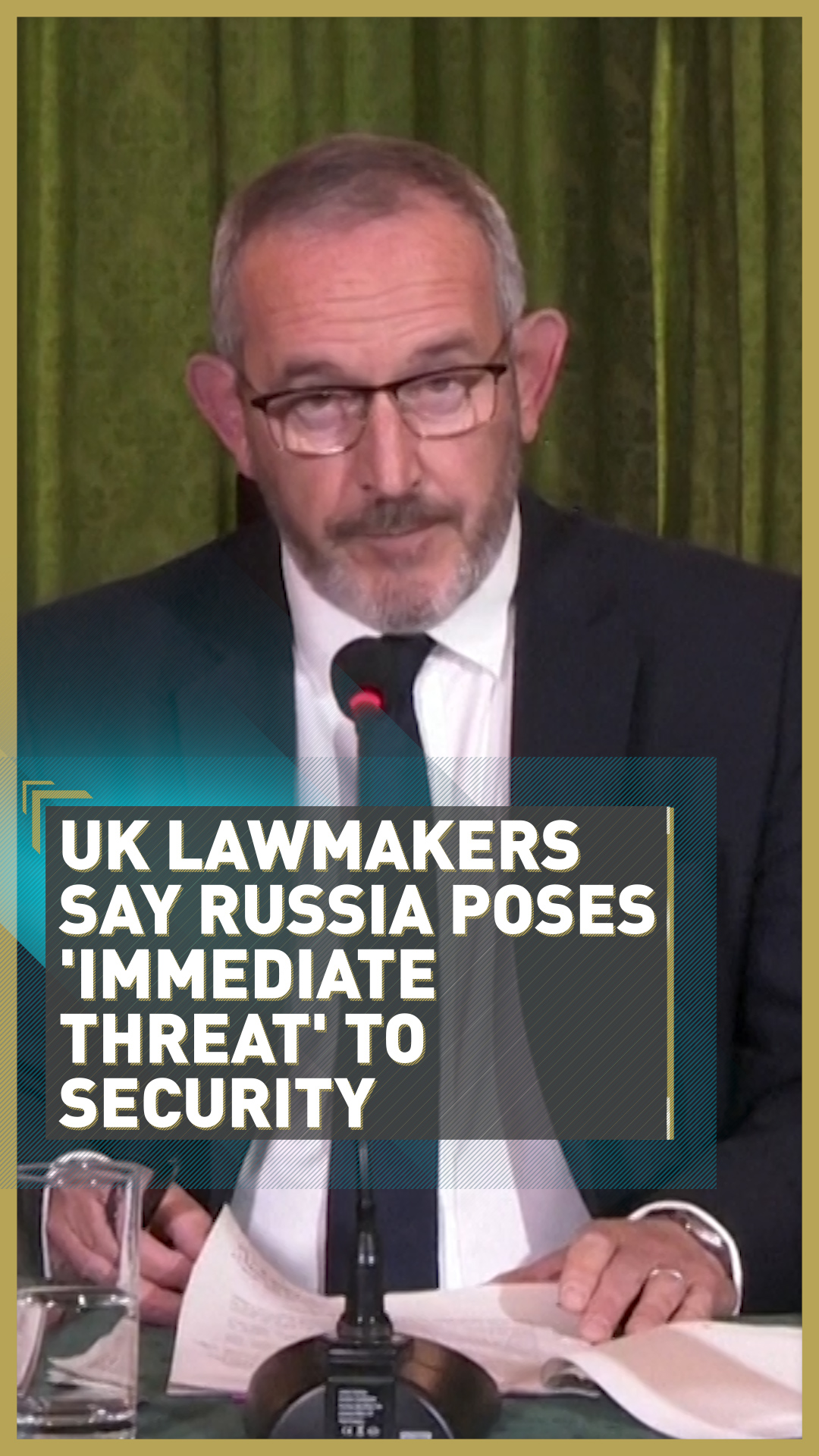02:21

The UK claims Russia poses an "immediate threat" to national security after releasing the long-awaited Russia Report on Tuesday.
The report was completed by the House of Commons Intelligence and Security Committee (ISC) nine months ago, with evidence from UK spy agencies, as well as independent experts, to examine Russia's threat to the UK and what has been done to counter it.
It was commissioned following suspicion of Russian interference in a 2014 referendum on Scottish independence and the Brexit referendum two years later, as well as the Salisbury poisonings of Sergei and Yulia Skripal in 2018.
The ISC revealed UK Prime Minister Boris Johnson had approved the report in December but that its publication had been delayed by the government.

Russia, led by President Vladimir Putin, poses an 'immediate security threat' to the UK, according to the report. /AFP
Russia, led by President Vladimir Putin, poses an 'immediate security threat' to the UK, according to the report. /AFP
In a summary of the report, the Scottish National Party's Stewart Hosie said its findings revealed Russia's security agencies are "disproportionately large and powerful" and can "act with little restraint."
However, Hosie issued a damning assessment of the UK government's lack of response to the threat posed by Russia and said it had "actively avoided" investigating suspicions of Russian interference.
He said: "The report reveals that no one in government knew if Russia interfered in or sought to influence the [Brexit] referendum because they did not want to know."
The question is who is protecting the British public from interference in our democratic process? Well, in a nutshell, we found no one is
- Kevan Jones, member of the Intelligence and Security Committee of Parliament
Hose said the UK must now undertake "retrospective work" to assess the impact of Russian interference on previous elections and referendums and said it was impossible to confirm the effectiveness of Russian bots, trolls and disinformation during the EU referendum.
ISC member Kevan Jones also criticized the government for failing to do enough to protect the UK from future security attacks.
He said: "The question is, who is protecting the British public from interference in our democratic process? Well, in a nutshell, we found no one is. It is a hot potato.
"The outrage isn't if there is interference, the outrage is no one wanted to know if there was interference. What we do know about Russian interference in the UK is it is the new normal."

The report has criticized the UK government for failing to protect the British public from 'interference in our democratic process.' /AP
The report has criticized the UK government for failing to protect the British public from 'interference in our democratic process.' /AP
The ISC also raised concerns over Russian influence in parliament and says the House of Lords must be more transparent in revealing its links to Russian oligarchs and businesses and donations members have received.
The report states: "Several members of the Russian elite who are closely linked to Putin are identified as being involved with charitable and/or political organizations in the UK, having donated to political parties, with a public profile which positions them to assist Russian influence operations.
"It is notable that a number of members of the House of Lords have business interests linked to Russia, or work directly for major Russian companies linked to the Russian state.
"These relationships should be carefully scrutinized, given the potential for the Russian state to exploit them."
Shortly after the report was published, Russia's foreign minister, Sergey Lavrov, labelled the findings as "Russophobia".
On Sunday, Russia's ambassador to the UK, Andrei Kelin, denied all allegations of interference in UK elections or referendums.
"We do not interfere at all," he told the BBC. "We do not see any point in interference because for us, whether it will be [the] Conservative Party or Labour's party at the head of this country, we will try to settle relations and to establish better relations than now."
Kelin also revealed Russia's desire to move on from allegations surrounding his nation's involvement in the Salisbury poisonings.
"We still do not understand why some spy story should disrupt these important business relations which will be very helpful to Britain ... when it is exiting from the European Union.
"We are prepared to turn the page and we are prepared to do business with Britain."

UK foreign secretary, Dominic Raab, accused Russia of "hostile state activity" and warned the country to "desist from its attacks on the UK and our allies".
UK foreign secretary, Dominic Raab, accused Russia of "hostile state activity" and warned the country to "desist from its attacks on the UK and our allies".
Meanwhile, UK foreign secretary, Dominic Raab, said the government "categorically rejected" accusations that they turned a blind eye to Russia interference and issued a statement condemning Russia's actions.
He tweeted: "We've been clear that Russia must desist from its attacks on the UK & our allies. We will be resolute in defending our country, our democracy & our values from such hostile state activity."